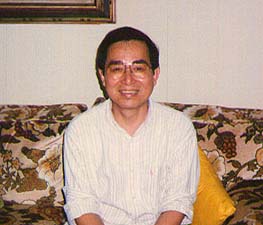

Nov. 21, 1996, Laie Hawaii
Conducted by Amy Smith
Junior at Kahuku High
![]()
Q: How old were you when the atomic bomb was dropped?
A: I was five years old living in Hiroshima, Japan.
![]()
Q: Where were you when the bomb went off?
A: I was at the school, inside playing with a little friend.
![]()
Q: Did you or Japan in general have any kind of warning that the bomb might be dropped?
A: No, there was no warning. At first those in Hiroshima thought that a gas tank had exploded.
![]()
Q:What did you do directly after the bomb exploded?
A: School hadn't started yet and so I was waiting for the teacher to come and was playing with my friend. I heard the siren go off and knew it was a severe warning because it was a broken siren. Then it changed back to a regular siren. I went back into the building and then saw a flash of light. Seconds later the door fell on top of me.
![]()
Q: What was the atmosphere like around you on the streets?
A: Houses were burning, telephone poles fell, people were running outside, crying and bleeding. I ran home and found my house tilted. No one was home. My mother had gone to a service project and my 9th grade brother was at school in the center of the city. My father was out on a boat.
![]()
Q: Did you or members of your family have any injuries or burns?
A: I had a burn on my forehead and my hair was burnt. My mother finally came home and was badly burned everywhere where her clothes weren't. I could hardly recognize her. A neighbor lady took her to her house. She lived for 20 days. My brother was also killed. My father looked for his body every day for several days. We never found him, but there were burned bodies found and we did find identifiable articles of his there, so we knew he was dead.
![]()
Q: What kind of things did you and your family face after the bomb?
A: My father was working on a ship for a transportation company and wasn't affected by the bomb. We went to a near by hospital and thousands of people were in the front yard. Everyone was crying for help. My father took my mother to her birth place to die there. My father also fixed our home immediately, but the food was bad. At school we ate grasshoppers and dumplings. At home we had pumpkin in the yard. I can't stand pumpkin today because we ate it so much then. The government warned us not to drink too much water even though we were thirsty. My father got remarried to my aunt (my mother's brother was killed by the bomb). She was my step-mother for 18 years and then she died of leukemia.
![]()
Q: How did you feel about the bomb and what had happened to your family and your community?
A: At the beginning I was too small to have prejudice or anger for the Americans, but I was scared of the Americans when they came into Hiroshima. I was glad the war was over and the Americans eventually did help Japan to grow and they sent us food.
![]()
Q: Did the Japanese people really know what was occurring in the war before the bomb?
A: We were aware of the war, but the radio only announced the winning portion. We were taught that Japan was a divine country and so we used to pray that Japan would win. We never thought that we might lose the war so we were ignorant in some regard.
![]()
Q: What was the worst part of the incident for you?
A: Losing my mother. I used to pray at the Buddhist altar that my mother would come back.
![]()
Q: Do you personally think the decision was necessary to the ending of the war, or do you think that another alternative could have been made?
A: I believe it was a mistake because Truman didn't think about taking so many innocent lives. About 400,000 lives were lost; some little by little. I look at it as America was experimenting. However, perhaps it was Japan's turn to sacrifice. Whatever we do we have to make some sacrifice and Japan had done some terrible things in Asia. I am not sure Japan would have surrendered without the bomb.
![]()
Q: How did you end up in Hawaii?
A: I converted to Christianity and became a Mormon and came to Hawaii to go to school at the Church College of Hawaii.
![]()
Q: Is your life different than it would have been today, because of the atomic bomb?
A: If it hadn't happened I would have had a better youth. I wanted a real mother. I think that Japan and America may still be fighting or enemies if America hadn't dropped the bomb. Becoming friends with America has brought some better things in life for the Japanese. We can't hate America, only the situation. War did the devastation to Hiroshima, not America.
![]()
Web page created by Alana Salom, student of The Learning Community